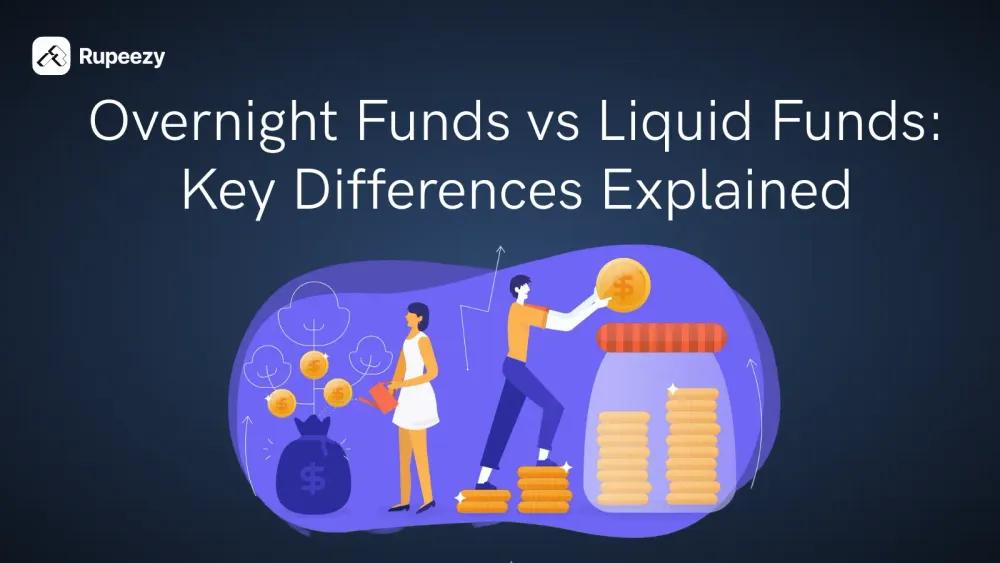Overnight Funds vs Liquid Funds: Key Differences Explained


00:00 / 00:00
The moment you start planning for an investment, you begin searching for options. But have you ever wondered that behind these options, there is an unconscious factor that aligns with the goals of investment? Be it a short-term or long-term investment, you need to select the type of mutual fund accordingly.
Not just that, there are different asset allocation ratios for each fund that you need to consider. While some funds focus more on debt, others invest heavily in equity or bonds. But two funds are usually compared before investing. These are the overnight funds and liquid funds.
Where the overnight funds offer you next-day maturity, the liquid funds offer you a bit longer tenure, ranging from weeks to months. So, this becomes even more important, overnight funds vs liquid funds. Let us explore the details.
What Are Overnight Funds?
Overnight funds are debt mutual funds. These are the funds that invest in securities maturing within one day. These include options such as Treasury Bills and government securities.
The fund manager redeploys the money daily. This ensures consistent liquidity and minimal risk. These funds are mainly chosen by investors or businesses who need to put their funds for a temporary time.
These are usually the cash surplus, which they do not need now but might need soon. This allows them to earn modest returns. The most common investment form here is lumpsum as SIP for a day is not possible.
Features of Overnight Funds
Invest in securities with one-day maturity
Minimal credit and interest rate risk
Highly liquid and easy to redeem
No lock-in period or exit load after one day
Provide stable, low-risk returns
Not affected by market or rate fluctuations
Ideal for very short-term parking of funds
Pros of Overnight Funds
Extremely safe investment option
High liquidity with easy redemption
No market volatility risk
Suitable for short-term surplus funds
Zero exit load after one day
Cons of Overnight Funds
Lower returns compared to liquid funds
Not suitable for long-term goals
Limited return potential
Returns may not beat inflation
What Are Liquid Funds?
Liquid funds are also a type of debt mutual fund. These are the ones that invest in short-term debt and money market instruments. These also include options like Treasury Bills, Certificates of Deposit (CDs), Commercial Papers (CPs), and short-term bonds.
These instruments have maturities of up to 91 days. This makes the liquid funds a preferred choice for investors. This is a choice that allows them to ensure they earn better returns than savings accounts with relatively low risk.
They are often used for emergency funds or short-term goals. The main aim of these funds is to offer security while ensuring that you gain some returns as well. The risk and return ratio in this is also low, but it works well for businesses.
Features of Liquid Funds
Invest in securities with a maturity of up to 91 days
Relatively low risk with higher potential returns than overnight funds
High liquidity with redemption usually processed within one working day
No lock-in period
Slightly sensitive to interest rate changes
Option for instant redemption in select fund houses
Suitable for emergency corpus or short-term parking of surplus cash
Pros of Liquid Funds
Higher returns compared to overnight funds and savings accounts
Reasonably safe and stable investment option
High liquidity with a quick redemption facility
Suitable for short-term financial goals
Can serve as an alternative to traditional bank deposits
Cons of Liquid Funds
Slightly higher risk than overnight funds
Returns can fluctuate mildly with interest rate changes
Not ideal for very short durations (less than 7 days)
Subject to short-term capital gains tax if withdrawn early
Difference Between Overnight Funds and Liquid Funds
Both overnight funds and liquid funds fall under the debt mutual fund category. There is no doubt that these two are designed for short-term investors. But when it comes to their true features, they differ. It is in terms of maturity, returns, and suitability. Both of these mutual funds are safe as compared to the rest options.
The table below highlights the key distinctions between liquid funds vs overnight funds.
Parameter | Overnight Funds | Liquid Funds |
Maturity Period | Invest in securities with 1-day maturity | Invest in securities with a maturity of up to 91 days |
Risk Level | Very low risk due to daily maturity | Low risk, but slightly higher than overnight funds |
Returns | Relatively lower returns | Higher returns compared to overnight funds |
Liquidity | Highest liquidity; funds can be withdrawn anytime | High liquidity; redemption within 1 working day |
Exit Load | No exit load after 1 day | No exit load after 7 days (as per SEBI rules) |
Market Sensitivity | Not affected by market or interest rate movements | Slightly affected by short-term rate fluctuations |
Ideal Investment Duration | 1–7 days | 7–90 days |
Investor Type | Suitable for parking idle funds for a few days | Suitable for short-term investors seeking better returns |
Example of Instruments | Treasury Bills, Overnight Repos | CPs, CDs, Treasury Bills, and Bonds |
Taxation | Taxed as per capital gains on debt funds | Same as overnight funds (debt fund taxation) |
In summary, liquid funds vs overnight funds is not so much. The actual power of compounding benefit in both of these funds is very low. These two mainly differ in their investment duration and potential returns. So, here is a quick conclusion on who should invest in which:
Overnight funds are ideal for investors seeking ultra-safe and just one-day parking options.
Liquid funds are better suited for those looking for slightly higher returns over a short period. But they do not want to compromise much on safety.
But no matter what you choose, ensure that you cross-check the mutual fund fact sheet in detail to make the right call.
Conclusion
Both overnight funds and liquid funds offer smart and short-term investment avenues. These are perfect for those looking to park surplus money safely. These are the funds that place the goal of safety first and then returns, which makes them unique in nature.
Where the overnight fund is great for immediate liquidity, the liquid fund can benefit you with quick short-term gains. But no doubt, both these options are great for investors who need quick returns. Before choosing between liquid funds vs overnight funds, assess all the aspects well. Start by checking the investment duration, risk comfort, and liquidity needs.
And if you are an investor who is looking for more mutual fund investment options, visit Rupeezy. This is the platform that makes investment simple, transparent, and quick to start.
FAQs
What is the main difference between overnight funds and liquid funds?
The main difference lies in the maturity period. Overnight funds invest in one-day securities, but the liquid funds invest in debt instruments with up to 91 days of maturity.
Are overnight funds safer than liquid funds?
Yes, overnight funds are considered safer. This is mainly because they mature daily and carry almost zero interest rate or credit risk.
Which gives better returns: liquid funds or overnight funds?
Liquid funds offer more returns as compared to overnight funds. This is due to their longer investment duration.
Can I use liquid funds for emergency savings?
Yes, liquid funds are suitable for emergency savings. They are safe and ensure you get funds when needed.
How can I invest in overnight or liquid funds?
You can invest in both these funds through trusted platforms like Rupeezy. You can compare and invest in the option that is best for you.
The content on this blog is for educational purposes only and should not be considered investment advice. While we strive for accuracy, some information may contain errors or delays in updates.
Mentions of stocks or investment products are solely for informational purposes and do not constitute recommendations. Investors should conduct their own research before making any decisions.
Investing in financial markets are subject to market risks, and past performance does not guarantee future results. It is advisable to consult a qualified financial professional, review official documents, and verify information independently before making investment decisions.

All Category









